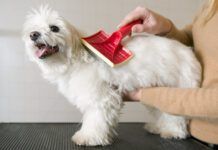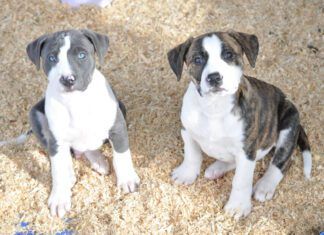Beds for Incontinent Dogs
Thank you for an excellent source of information. I look forward to every issue, and there is such great information in each one.
I ordered a back issue so I could read your article on dog beds (“Strange and Wonderful Bedfellows,” July 1998), and actually, I even ordered the recommended “deluxe” bed from the catalogue mentioned in the article.
The people in the industry who are producing products for dogs are really listening to what you say – see the new Fosters and Smith catalogue that says, next to its premium dog bed, “As seen in the Whole Dog Journal.” Please get the message to them that they need to combine an ORTHOPEDIC dog bed with one that is WATERPROOF for incontinent pets. Fosters and Smith have another kind of dog bed in their catalogue that is waterproof (the only one I’ve ever seen), but it is not orthopedic!
I have had three older dogs who have developed occasional incontinence, and when a foam rubber mattress gets soaked in urine it is impossible to get clean and dry. These older dogs really need a good “eggcrate foam” type mattress for their tired joints and bones, and I sure would like to have one that has a waterproof cover.
In the past, I have ordered orthopedic dog beds that arrived covered with a thin plastic envelope. I usually remove the plastic, then remove the zippered dog bed cover, and slip the plastic over the foam and then put the dog bed cover over that. However, that thin plastic cover doesn’t last long. I have also tried using zippered waterproof crib mattress covers over the beds, but these don’t last long either.
Please, manufacturers, if you are listening, we need a top-quality orthopedic dog bed with a waterproof cover. If I have had three dogs with incontinence, then surely there must be a lot of other people out there who also have dogs with the same problem. The waterproof cover would also be useful when dogs come in damp from the rain.
-Lyn Fry
Santa Cruz, California
Skin Problems – Wet Dogs
After reading the letter from the reader who had a Labrador with recurrent ear infections (“Answers from Experts,” October 1998) I thought this might be of interest. I have a four-year-old purebred black Lab who had symptoms of seasonal allergies ever since he was about four months old – runny eyes, itchy skin, ear infections. He also started getting bald spots on his throat and upper chest area.
We finally realized that he itched the most after swimming. Huge pieces of his skin would peel off his chest area. Our veterinarian diagnosed this as a staph infection caused by moisture. No matter how well I towel-dried him, he would get a staph infection, and the medicine for the infection also made his dead skin peel off like a sunburn. We had to keep him from swimming altogether.
He also suffered from really bad hot spots where the vet would have to shave an area as large as eight inches to allow the hot spot to air out. We also suspected this was caused by allergies, so I kept changing his food, trying to find one that he didn’t seem allergic to. I finally pinned down the allergen: fish oil, which was in one of the foods we tried and in one of the supplements we were giving him to help his coat.
I now have him on a venison and potato food supplemented with flaxseed oil (which offers the same benefits of fish oil, without aggravating his allergies), vitamin C, and Bio-Coat. I started this diet in May of this year and what a difference!
We’ve since learned that it’s not all water that he has to stay away from; he only has trouble with swimming in spring and summer, when pollen levels are high. When he is exposed to a lot of pollen, and he gets wet, he gets staph. But now that the pollen season is over, I can allow him to swim as much as he wants and there is no infection.
-Ann Nelson
Gansevoort, NY
Underlying Causes
I enjoyed my first issue of your magazine very much, but as a “conventional” veterinarian I must object to the characterization of “conventional veterinarians” penned by Dr. William Falconer in your “Answers from Experts” column (October 1998). Contrary to Dr. Falconer’s statements, conventional veterinarians have long recognized that aural yeast infections in dogs are frequently secondary to another, underlying cause. It is well known among conventional veterinarians that a cure cannot be achieved until these underlying causes are addressed.
I am aware of no evidence establishing a link between puppyhood vaccines and ear infections. I do know that life-threatening puppy infections by distemper and parvovirus have been eliminated in my practice by appropriate vaccination, in spite of the fact that both diseases – particularly parvovirus – remain rampant in my practice area.
-Mark Zimmerman, DVM
Stockton, California
Holistic Bird Care?
I have subscriptions to both the Whole Dog Journal and the Whole Horse Journal. I’m finding that the two contain a lot that applies to either species. I also have cockatiels and am just starting to learn about them. I have not had much luck locating information on natural/alternative methods of caring for them or their disorders. I would appreciate any information you could send my way.
-Marie Speicher
Michigan
You might check with the American Holistic Veterinary Medical Association (AHVMA), whose contact numbers are always listed in our Resources section; they could probably point you to holistic avian specialists. Also, we are aware of one natural pet food producer, Halo, maker of “Spot’s Stew” for dogs and cats, who also makes a line of organic bird seeds. Halo can be reached at (813) 854-2214.
Raw Meat Diet Cures Colitis
Hurray for the article on natural rearing! (“A Winning Diet,” November 1998). I want to share a positive experience I’ve had with similar “natural feeding” plans.
I’ve had Fila Brasileiros (rare breed canines) for the past 10 years. I have a neutered male, Gubbio, who is a healthy 172 pounds. (He is not fat!) About two and a half years ago, he developed ulcerative colitis, an autoimmune disease. At the time, he was receiving conventional veterinary care, (i.e. the usual steroids) for his problems. He had terrible health, with bloody stools that contained globs of mucus. His health continued to deteriorate with steroids and conventional care, with systematic manifestations of his poor immune function.
I finally reached my limit, and purchased every book written on the holistic and natural approach to veterinary care. I told my dog that it was going to be sink or swim. I read everything that I got my hands on, but especially used The Complete Handbook for Dogs and Cats, by Juliette de Bairacli, as my Bible.
I used the following diet for Gubbio, with 100 percent cure of his ulcerative colitis after four weeks on the diet:
Gubbio’s Daily Diet:
2 cups of adult Solid Gold’s Hund-N-Flocken 2X/day
.5 to .75 pounds of raw beef chunks 2X/day
Vitamin B complex 100 mg 2X/day
2000 mg of vitamin C (sodium ascorbate) 2x/day
1 tsp. safflower oil 2X/day
1 tsp. Barley Dog 2X/day
1 tsp. digestive enzymes 2X/day
1 tsp. fresh, pureed garlic 2x/day
1 tsp. organic bone meal (1650 mg per tsp) 2X/day
2-3 capsules of probiotics (acidophilus, bifidus and other bowel-friendly bacteria) 2X/day
Occasional raw beef shank bones to clean the teeth
Parsley juice (parsley and water in a blender) for moisture
After four weeks, Gubbio no longer had any symptoms of ulcerative colitis, and had normal bowel movements. In addition, he had a beautiful, shiny coat, energy and vitality like a puppy (he is six years old). I am convinced his terrible immune state was due to a conventional diet and over-vaccination.
The challenge is finding competent veterinarians who practice both holistic and conventional medicine, and who support raw meat diets.
-Dawn Marini
Brooksville, FL
Corrections
In the November issue, we reported an incorrect phone number for our top selection in heat therapy pads. Prism Technologies, maker of “The Heat Solution,” and located in San Antonio, Texas, can be reached at (800) 432-8722.
In the December issue, the number for our favorite no-slip collar was listed with too many digits. The correct number for the Lupine Company, maker of the Lupine Combo collar, is (800) 228-9653.
Negative to POSITIVE: In the June 1998 issue, we examined car safety seats and seat belts for dogs, panning Foster & Smith’s “Comfort Ride Pet Seat.” We found the product to be well made, but it was our impression that the seat’s belt was designed to fasten to the dog’s collar (which could result in an injury to the dog in an accident). In actual fact, the maker of the Comfort Ride provides an instruction sheet with the Comfort Ride, firmly suggesting the use of “non-neck collar type harnesses” only with the seat.
Whether we lost the instructions or whether a sheet was not provided with the product we tested is a mystery. The important thing is, this new information changes our review from a negative one to an enthusiastic endorsement. The Comfort Ride is available from Drs. Foster & Smith, (800) 562-7169, or from Aquiline Innovations, (916) 991-2409.





